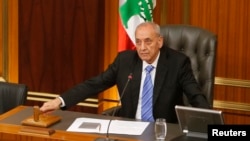BEIRUT, LEBANON —
Lebanon's parliament has voted to postpone elections scheduled for June 16 because of security concerns about the unstable security situation in the country brought on by the conflict in neighboring Syria.
The decision by Lebanese lawmakers to postpone elections and extend their mandate until November 2014 is the first time they have done so since the Lebanese civil war ended in 1990.
The move comes after an uptick in violence in recent weeks due to the war in neighboring Syria.
Sami Nader, an international relations professor at Saint Joseph University, said the decision sends a damaging message to a Lebanese public craving political stability.
"People are losing hope. It’s the wrong signal for the youth because youth are giving up when it comes to their attachment to Lebanon because they are considering that they’re living in a kind of a jungle. It’s the wrong message for the investors and foreign investment… it’s the wrong message all across the line," said Nader.
Lebanese are ideologically divided over the Syrian war.
The so-called March 14th coalition, which is supported by the West, Saudi Arabia and Qatar, sides with the Syrian opposition. The March 8th coalition, aligned with Iran, supports Syrian President Bashar al-Assad.
Tensions have risen since the political and militant Shi'ite movement Hezbollah announced it is fighting alongside Syrian government forces.
Nader said the the two coalitions cannot agree on much. "They never agreed on forming a new government. They never agreed on unified foreign policy, they only agree to extend their power. The major driver for security in a diversified country like ours is… a solidified political agreement. So they were pretexting the security situation but they are the responsible of the security situation. I mean this was so paradoxical."
Outside the parliament building in downtown Beirut, protesters threw tomatoes at the lawmakers’ cars and carried coffins symbolizing the burial of democracy.
Following the vote, lawmakers said they want to take advantage of the additional time to work on reaching an electoral law that would provide fair representation.
The decision by Lebanese lawmakers to postpone elections and extend their mandate until November 2014 is the first time they have done so since the Lebanese civil war ended in 1990.
The move comes after an uptick in violence in recent weeks due to the war in neighboring Syria.
Sami Nader, an international relations professor at Saint Joseph University, said the decision sends a damaging message to a Lebanese public craving political stability.
"People are losing hope. It’s the wrong signal for the youth because youth are giving up when it comes to their attachment to Lebanon because they are considering that they’re living in a kind of a jungle. It’s the wrong message for the investors and foreign investment… it’s the wrong message all across the line," said Nader.
Lebanese are ideologically divided over the Syrian war.
The so-called March 14th coalition, which is supported by the West, Saudi Arabia and Qatar, sides with the Syrian opposition. The March 8th coalition, aligned with Iran, supports Syrian President Bashar al-Assad.
Tensions have risen since the political and militant Shi'ite movement Hezbollah announced it is fighting alongside Syrian government forces.
Nader said the the two coalitions cannot agree on much. "They never agreed on forming a new government. They never agreed on unified foreign policy, they only agree to extend their power. The major driver for security in a diversified country like ours is… a solidified political agreement. So they were pretexting the security situation but they are the responsible of the security situation. I mean this was so paradoxical."
Outside the parliament building in downtown Beirut, protesters threw tomatoes at the lawmakers’ cars and carried coffins symbolizing the burial of democracy.
Following the vote, lawmakers said they want to take advantage of the additional time to work on reaching an electoral law that would provide fair representation.




